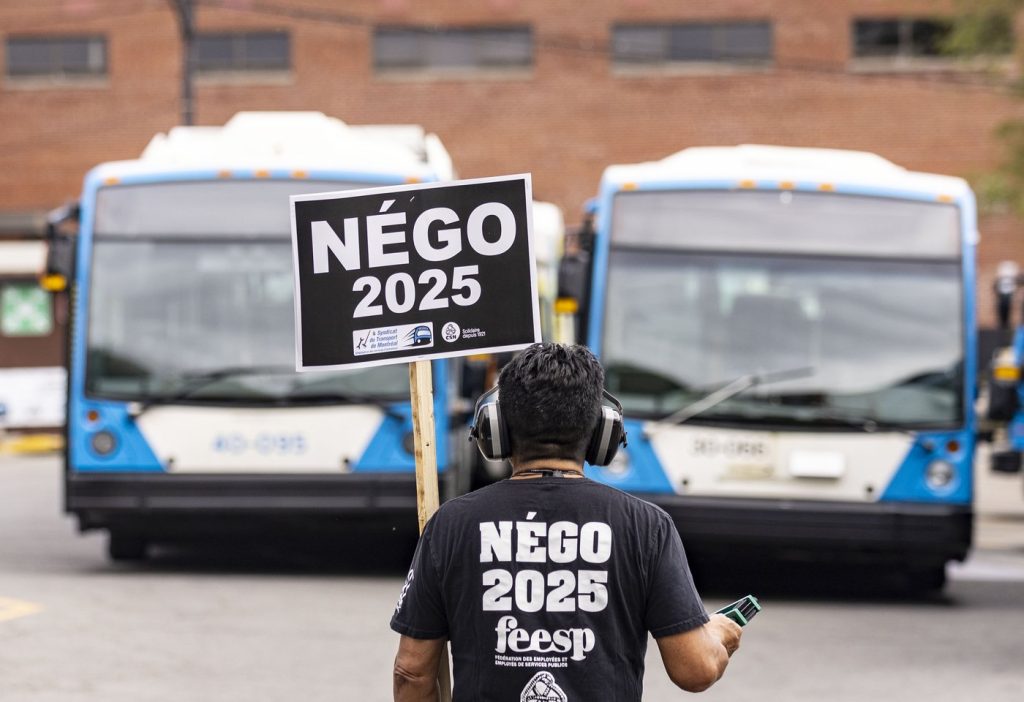MONTREAL — A significant strike involving the Montreal transit agency's 2,400 maintenance workers is currently disrupting public transit in the city and may serve as the inaugural test of a controversial new law enacted by the Quebec government, granting it extensive powers to resolve labor disputes.
The strike commenced on October 31, 2025, and is expected to persist throughout November. This work stoppage, which marks the third strike this year, has subsequently limited bus and subway services to peak hours, severely impacting daily commuters.
Political leaders are encouraging both parties to expedite negotiations, which have been ongoing for several months. However, the workers' union has accused the transit agency of deliberately delaying progress until the new labor law, introduced earlier in 2025, goes into effect at the end of November. This law empowers Quebec's labor minister to resolve disputes through binding arbitration if a strike or lockout is deemed detrimental to the public.
Additionally, the law broadens the range of essential services that must continue during a labor dispute, explicitly including those deemed vital to “the well-being of the population.” Bertrand Guibord, an official representing the transit workers’ union, expressed concerns that the new legislation would lead employers to avoid resolving disputes proactively. “In other words, clearly, from now on, employers will no longer be under pressure to settle,” he stated during a recent press conference.
Barry Eidlin, an associate professor of sociology at McGill University with expertise in labor movements, characterized the law as “an existential threat to unions.” He pointed out parallels between this law and a section of the Canada Labour Code that the federal government has utilized frequently over the past year to terminate strikes at various sectors, including ports and railway companies. Both laws provide ministers with considerable discretion to intervene in labor disputes, which, according to Eidlin, lacks sufficient checks and balances.
The Montreal transit agency, in defense of its position, has articulated that the salary demands presented by the workers are significantly beyond its financial capabilities. Nonetheless, Eidlin asserts that the new law creates a “escape hatch” for employers, ultimately diminishing the incentive to reach agreements at the bargaining table. He interprets the union's strategic announcement of the month-long strike as an effort to exert maximum pressure on the transit agency to finalize a deal before the law takes effect on November 30.
In contrast to the union's perspective, Michelle Llambías Meunier, president and CEO of the Quebec employers council, stated that Montreal residents are “being held hostage” by the ongoing strike, which is hampering many individuals from reaching their workplaces. She urged the provincial government to consider implementing the new law sooner if the two parties fail to reach a resolution promptly.
Llambías Meunier emphasized that the objective of the law is not to curtail the right to strike but rather to harmonize the respect for workers’ rights with the essential continuity of services imperative for both the population and Quebec’s economy.
Quebec Labour Minister Jean Boulet expressed his concerns regarding the protracted nature of the dispute, indicating that the ongoing strike is adversely impacting those reliant on public transit. He noted the urgency for a swift resolution to the negotiations.
Previously in 2025, the maintenance workers had initiated two other strikes—first for nine days in June and again for 14 days in September and October. The primary sticking points in their negotiations remain focused on wage increases and the outsourcing of certain maintenance jobs.
Eidlin further commented that Boulet might interpret the maintenance workers’ role as providing “services ensuring the well-being of the population.” However, he highlighted the law’s ambiguity regarding which services are classified under this definition, suggesting the list could be extensive and hinder the effectiveness of strikes as leverage in labor negotiations.
In a separate legal context, four faculty associations from McGill University filed a court challenge against the new law in August, claiming it infringes upon the constitutional right to strike. Additionally, the union representing maintenance workers has indicated its intention to challenge the law once it becomes operational. The federal government's application of Section 107 of the Canada Labour Code to conclude strikes is also facing legal scrutiny. Experts like Eidlin predict that the matter could escalate to the Supreme Court of Canada, which recognized the constitutional protection of the right to strike in its 2015 ruling.











